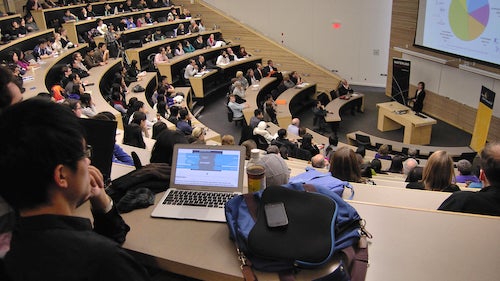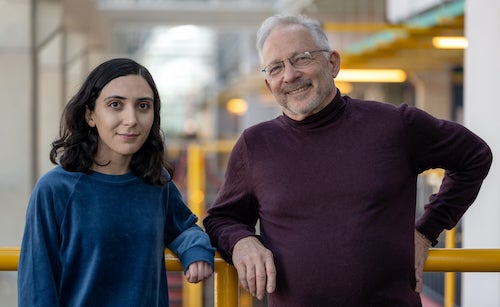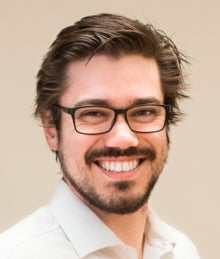- Adapting teaching practice and promoting academic integrity
- Niki Hasrati and Shai Ben-David receive best paper award at ALT 2023
- Keeping sun-seekers safe
- Q and A with the experts: Using social science to forecast societal change
- Waterloo Centre for German Studies announces international travel award opportunities
- Police agencies host fraud awareness webinar for international students
Editor:
Brandon Sweet
University Communications
bulletin@uwaterloo.ca
Adapting teaching practice and promoting academic integrity

By Jon Parsons. This article originally appeared on Waterloo News.
AI tools like ChatGPT are disruptive technologies for many sectors, including for higher education. But while such new technologies seem to change all the rules, they are no cause for panic.
That’s the view of education and academic integrity experts at the University of Waterloo.
“Teaching and learning is always evolving, and we need to find ways to work productively with these new tools,” says Dr. Donna Ellis, director of Waterloo’s Centre for Teaching Excellence. “We need to get the balance right between making wise use of new tools in the context of good policy and good teaching. Instructors will need time to adapt, but at the end of the day it’s just another tool.”
The Office of the Associate Vice-President, Academic created an FAQ for instructors to help in planning courses and assessments in light of evolving AI tools.
As Ellis sees it, the University has a responsibility to prepare students for a digital economy in which people need to adapt to new technology. Students are going to see tech like ChatGPT in the workplace and in co-op placements, so “we can’t pretend like these new technologies don’t exist,” she says.
Promoting academic integrity
Much of the discussion around ChatGPT in higher education has focused on the ways it may enable academic misconduct.
But it is important to remember that not all students engage in academic misconduct because of the availability of technological tools, says Amanda McKenzie, Waterloo’s director of quality assurance and academic integrity.
“The vast majority of students don’t do it purposely. It is situational,” McKenzie says. “They fall into it for a variety of reasons. What’s going on in their life? Are they organized with their time? Are they pulling down a job outside of school? Are there family pressures to get grades? Different stressors can add up to poor decision-making. That might lead students into a situation where they would engage in academic misconduct.”
Waterloo promotes six fundamental values of academic integrity, based on the work of the International Centre for Academic Integrity: honesty, trust, respect, responsibility, fairness and courage. And as McKenzie notes, this applies to everyone in the University community, not just students.
“Faculty and staff are role models in everything they do, and we all need to demonstrate the behaviour we want students to emulate,” she says.
Adapting assessment
Along with being good role models, instructors can often adapt assessments to new technologies like ChatGPT. Grounding assignments in best practices for teaching and learning make it so there is little incentive to engage in academic misconduct.
“When instructors provide multiple opportunities to show evidence of learning along the way, it helps students not get into a situation where they feel they have to do everything at the last minute,” says Dr. Mary Power, senior educational developer with the Centre for Teaching Excellence.
One way to do that is with multi-step assignments, such as submitting an outline and multiple drafts of a term paper. Receiving ongoing feedback at multiple stages makes for the best learning and helps students better manage their time.
Other strategies include “designing assessments that call on students to use higher level synthesis or analysis, drawing on specifics of the course or their experience, rather than just demonstrating basic knowledge of concepts,” Power continues.
An ongoing process
Recognizing the importance of staying ahead of the curve of technological change, Waterloo formed a new ad hoc group to provide recommendations to instructors and the broader University community.
A Standing Committee on New Technologies and Academic Integrity will formalize already-existing working relationships between the Centre for Teaching Excellence, the Office of Academic Integrity, faculty members and other campus stakeholders on issues of technological change.
Learn more about the work happening at the Centre for Teaching Excellence and the Office of Academic Integrity.
Niki Hasrati and Shai Ben-David receive best paper award at ALT 2023

Niki Hasrati and Shai Ben-David.
This article was originally published on the Cheriton School of Computer Science website.
Master’s candidate Niki Hasrati and Professor Shai Ben-David have received the best paper award at ALT 2023, the 34th International Conference on Algorithmic Learning Theory. This year, the annual meeting that explores the theoretical and algorithmic aspects of machine learning will take place in Singapore from February 20 to 23.
Their paper, “On Computable Online Learning,” studies online learning with computable learners. It analyzes that question under various requirements for successful learning. The paper gives a necessary and sufficient condition for optimal computable online learning and shows that the Littlestone dimension — a combinatorial parameter that characterizes online learnability without computability requirements — no longer applies when the learners are required to be computable.
Niki Hasrati is a master’s student at the Cheriton School of Computer Science, advised by Professor Shai Ben-David. Her research interests intersect theoretical computer science and theoretical machine learning. She studies online learning, private learning, combinatorial characterizations of different learning models, and non-worst-case analysis of computational and statistical resources required for learning.
Shai Ben-David is a University Research Chair and Professor at the Cheriton School of Computer Science. He is also a faculty member at the Vector Institute and a Canada CIFAR Artificial Intelligence Chair. His research spans a wide spectrum of topics in the foundations of computer science and its applications, with a particular emphasis on statistical and computational machine learning. The common thread throughout his research is to provide mathematical formulation and understanding of real-world problems.
About this award-winning research
Two central setups for machine learning are batch learning, where the learner is given a set or batch of randomly generated training examples, and online learning, where the learner encounters examples one at a time and gets feedback on its performance on each example before being challenged with the next one.
A fundamental question in each of these setups is distinguishing between learnable and unlearnable tasks. Learnability in the batch setup is known to be characterized by the Vapnik–Chervonenkis dimension (see Vapnik and Chervonenkis, 1971) and learnability in the online setup is characterized by the Littlestone dimension (see Littlestone, 1988).
In both cases, however, learnability is defined in terms of the existence of a successful learning function — for example, a mapping of training examples to learned models. In their ALT 2020 paper, Agarwal, Ananthakrishnan, Lechner, Ben-David and Urner pointed out that in practical machine learning, one cares only about learners that can be realized by computer programs, what are known as computable learners. They showed that once one considers only such learners, the Vapnik–Chervonenkis dimension no longer characterizes learnability in the batch setup.
Niki and Shai’s 2023 award-winning paper addresses the question of computable learnability in the online learning setup. The paper analyzes various notions of success, or optimality, of an online learner when learners are required to be computable — that is, when they are executable by an algorithm. Their paper shows that, in fact, the well-known characterization of online learnability by the Littlestone dimension breaks down in the context of computable learning. The answer required the use of sophisticated recursion theoretic analysis, as well as careful examination of different tasks that an online learner may be faced with.
To learn more about the research that resulted in Niki and Shai receiving the best paper award at ALT 2023, please see Niki Hasrati, Shai Ben-David. On Computable Online Learning. 34th International Conference on Algorithmic Learning Theory (ALT), 2023.
Keeping sun-seekers safe

This story was first featured in WEAL 2022.
Sunscreen can help prevent skin cancer, but only if it is used correctly. Andrew Martinko (BASc ’15, nanotechnology engineering, MBET ’16) and his Capstone team decided to give sun-seekers a little nudge.
They developed UV-activated ink you apply with a marker before slathering on sunscreen. When the ink turns purple, it’s time to reapply. The idea attracted all kinds of attention, especially after they were named runners-up for the prestigious international James Dyson innovation award.
To bring their marker to market, the group founded Suncayr. What followed next was a lot of pivoting. Initial feedback on the product was good, but when they dug a little deeper, questions started to emerge. How much ink do I need? Will kids think it’s okay to draw on themselves with other kinds of markers? The team went back to the drawing board and created UV-sensitive stickers instead.
Then, just before their U.S. retail launch, COVID-19 hit and people stayed away from stores.
Martinko and co-founder Chad Sweeting (BASc ’15, nanotechnology engineering) persevered. They brokered an acquisition by Dig It Apparel, which brought substantial branding and sales experience, and focused on online sales. Today, they’ve attracted hundreds of thousands of Amazon customers and a raft of five-star reviews.

Andrew Martinko, co-founder of Suncayr.
Martinko gives a lot of credit to early support from the Waterloo entrepreneurship ecosystem, including backing from the Engineer of the Future Fund and the Esch awards. He particularly cites Velocity Science, a “phenomenal program” where they could see other entrepreneurs struggle, be inspired by their successes and talk through issues over a beer.
So what advice would Martinko now share with young entrepreneurs over a beer?
“Just start,” he says. “Even if it goes belly up, it’s all going to look pretty good on a résumé.”
Q and A with the experts: Using social science to forecast societal change

Pandemic impacts on people everywhere brought a unique opportunity for social scientists to study and forecast changes in society. The Forecasting Collaborative was founded in 2020 by Dr. Igor Grossmann, associate professor of psychology at the University of Waterloo, to evaluate the accuracy of social and data scientists' approaches in predicting social change.
What was the major finding of your study?
The study revealed that social scientists were overall no better at predicting how major social issues – well-being, prejudice toward minorities, or political polarization – would unfold over the first year of the pandemic than the general public or statistics such as the historical average. We did find that consideration of prior data and multidisciplinary research teams were somewhat more accurate.
Since no one can predict the future, how should social scientists engage in social commentary?
Scientists should be mindful of their limitations. Along with consideration of base-rate information and an appreciation of temporal dynamics in their studies, social scientists would benefit from more intellectual humility and consider if their lab studies scale up to what happens "in the wild." In addition, they should avoid predictions without necessary caveats. For instance, a researcher said at a major scientific conference that their theory "predicted everything in the pandemic." It is statements like this that damage the credibility of social scientists.
Is there a risk of eroding public trust in social science research?
Yes, especially if one makes predictions about things one has little knowledge about –one may know how to explain a particular phenomenon but not know how to predict the next steps in this phenomenon. Social scientists should be aware of the limits of their knowledge, and junior scientists should receive better training in prediction methods to mitigate this risk.
Insights into accuracy of social scientists' forecasts of societal change by Grossmann et al. is published in the journal Nature Human Behaviour.
Waterloo Centre for German Studies announces international travel award opportunities

The Waterloo Centre for German Studies is pleased to announce that the annual travel award applications are open.
Stork Awards in German Studies
The Waterloo Centre for German Studies is once again offering the Stork Award to full-time graduate and undergraduate students at the University of Waterloo who will be participating in a recognized institutional Canadian-organized German language or cultural studies program abroad. The travel awards, valued at $500 and $1500, are available to students in all disciplines. Deadline for applications is March 1. Please visit the WCGS webpage for more information.
Marga I. Weigel German Study Abroad Award
Up to five awards, valued at $1000 each, are available for full-time University of Waterloo undergraduate students in any program who are participating in the Waterloo Summer Language School in Germany or equivalent. Deadline for applications is March 1. Please visit the WCGS webpage for more information.
For any questions about these travel awards, please contact the Waterloo Centre for German Studies at wcgs@uwaterloo.ca.
Police agencies host fraud awareness webinar for international students
The Royal Canadian Mounted Police (RCMP), Canadian Border Services Agency and local police agencies are offering a Fraud Awareness for International Students webinar on Thursday, February 23. The University of Waterloo’s Special Constable Services has been working closely with Waterloo Regional Police Services to make international students aware of fraud schemes that target them and are in support of this awareness opportunity.
As part of the webinar, the Canadian Border Services agency will discuss common immigration fraud schemes that international students should be aware of, and the Bank of Canada will help international students understand Canadian currency and what security features it holds so students can avoid getting stuck with counterfeit banknotes. Additionally, the RCMP’s Federal Policing Prevention and Engagement unit will provide an overview of the top frauds affecting Canadians.
The 2-hour webinar takes place on Thursday, February 23 at 1:00 p.m. Register to receive the webinar link. Contact the RCMP’s Federal Policing and Prevention and Engagement with any questions you might have.
Link of the day
When and Where to get support
Students can visit the Student Success Office online for supports including academic development, international student resources, immigration consulting, leadership development, exchange and study abroad, and opportunities to get involved.
Instructors looking for targeted support for developing online components for blended learning courses, transitioning remote to fully online courses, revising current online courses, and more please visit Agile Development | Centre for Extended Learning | University of Waterloo (uwaterloo.ca).
Faculty, staff, post-doc and graduate student instructors can find upcoming teaching and learning workshops, self-directed modules and recordings of previous events on Centre for Teaching Excellence Workshops and Events page.
Instructors can access the EdTech Hub to find support on Waterloo’s centrally supported EdTech tools. The Hub is supported by members of IST’s Instructional Technologies and Media Services, Centre for Teaching Excellence, Centre for Extended Learning and subject matter experts from other campus areas.
Supports are available for employees returning to campus. Visit IST’s Hybrid Work and Technology guidelines and workplace protocols to assist with the transition.
Students with permanent, temporary and suspected disabilities and disabling conditions (medical conditions, injuries, or trauma from discrimination, violence, or oppression) can register with AccessAbility Services for academic accommodations (classroom accommodations, testing accommodations, milestone accommodations).
Instructors can visit AccessAbility Services' Faculty and Staff web page for information about the Instructor/Faculty role in the accommodation process. Instructors/Faculty members are legally required to accommodate students with disabilities. AccessAbility Services (AAS) is here to help you understand your obligations, and to offer services and resources to help you facilitate accommodations.
Did you know that the Writing and Communication Centre offers many in-person and virtual services to support you with any writing or communication project? This term we've added The Write Spot: a new student space in South Campus hall, complete with bookable workspaces, drop-ins with our peer tutors, and free coffee and tea. We also have one-to-one appointments with our writing and communication advisors and peer tutors, email tutoring for grads and undergrads, drop-ins at Dana Porter Library, online workshops, writing groups, English conversation practice, and even custom in-class workshops. For any communication project, the Writing and Communication Centre is here to support you.
Research Ethics: Find yourself with an ethical question, unsure if your work requires an ethics review, or need advice about putting together a research ethics application? Reach out to one of our friendly staff by booking a consultation or email us with your questions.
Co-op students can get help finding a job and find supports to successfully work remotely, develop new skills, access wellness and career information, and contact a co-op or career advisor.
The Centre for Career Action (CCA) has services and programs to support undergrads, grad students, postdocs, alumni, and employees in figuring out what they value, what they’re good at, and how to access meaningful work, co-op, volunteer, or graduate/professional school opportunities. Questions about CCA's services? Live chat, call 519-888-4047, or stop by our front desk in the Tatham Centre 8:30 a.m. to 4:30 p.m., Monday to Friday.
Drop-in to in-person Warrior Study Halls on Thursdays from 5:00 p.m. to 6:30 p.m. in DC and DP. Join a Peer Success Coach to set goals and work independently or in groups each week.
Renison's English Language Institute continues to offer virtual events and workshops to help students practice their English language skills.
If you feel overwhelmed or anxious and need to talk to somebody, please contact the University’s Campus Wellness services, either Health Services or Counselling Services. You can also contact the University's Centre for Mental Health Research and Treatment. Good2Talk is a post-secondary student helpline available to all students.
The Library is here to help, both in person and online. Our spaces are open for access to book stacks, study spaces, computers/printers, and the IST Help Desk. For in-depth support, meet one-to-one with Librarians, Special Collections & Archives and Geospatial Centre staff. Visit the Library’s home page to access our online resources for anywhere, anytime learning and research.
The Faculty Association of the University of Waterloo (FAUW) continues to advocate for its members. Check out the FAUW blog for more information.
The University of Waterloo Staff Association (UWSA) continues to advocate for its members. Check out the UWSA blog for more information.
The Office of Equity, Diversity, Inclusion & Anti-Racism (EDI-R) works with students, faculty and staff across campus to advance equity and Anti-racism through evidence-based policies, practices and programs. If you have a concern related to Anti-racism and/or equity, please complete our intake form.
The Sexual Violence Prevention and Response Office (SVPRO) supports all members of the University of Waterloo campus community who have experienced, or been impacted, by sexual violence. This includes all students, staff, faculty and visitors on the main campus, the satellite campuses, and at the affiliated and federated Waterloo Institutes and Colleges. For support, email: svpro@uwaterloo.ca or visit the SVPRO website.
The Office of Indigenous Relations is a central hub that provides guidance, support, and resources to all Indigenous and non-Indigenous campus community members and oversees the University's Indigenization strategy.
The Waterloo Indigenous Student Centre, based at United College, provides support and resources for Indigenous students, and educational outreach programs for the broader community, including lectures, and events.
WUSA supports for students:
Peer support - MATES, Glow Centre, RAISE, Women’s Centre - Click on one of the links to book an appointment either in person or online for the term.
Food Support Service food hampers are currently available from the Turnkey Desk 24/7 in the Student Life Centre. Drop-off locations are also open again in SLC, DC, DP, SCH, and all residences.
Co-op Connection all available online.
Centre for Academic Policy Support - CAPS is here to assist Waterloo undergraduates throughout their experience in navigating academic policy in the instances of filing petitions, grievances and appeals. Please contact them at caps@wusa.ca.
WUSA Student Legal Protection Program - Seeking legal counsel can be intimidating, especially if it’s your first time facing a legal issue. The legal assistance helpline provides quick access to legal advice in any area of law, including criminal. Just call 1-833-202-4571.
Empower Me is a confidential mental health and wellness service that connects students with qualified counsellors 24/7. They can be reached at 1-833-628-5589.
GSA-UW supports for graduate students:
The Graduate Student Association (GSA-UW) supports students’ academic and social experience and promotes their well-being.
Advising and Support - The GSA advises graduate students experiencing challenges and can help with navigating university policies & filing a grievance, appeal, or petition.
Mental Health covered by the Health Plan - The GSA Health Plan now has an 80 per cent coverage rate (up to $800/year) for Mental Health Practitioners. Your plan includes coverage for psychologists, registered social workers, psychotherapists, and clinical counselors.
Dental Care - The GSA Dental Plan covers 60 to 70 per cent of your dental costs and by visiting dental professionals who are members of the Studentcare Networks, you can receive an additional 20 to 30 per cent coverage.
Student Legal Protection Program - Your GSA fees give you access to unlimited legal advice, accessible via a toll-free helpline: +1-833-202-4571. This advice covers topics including housing disputes, employment disputes, and disputes with an academic institution.
The Graduate House: Open Monday to Tuesday 11:30 a.m. to 7:00 p.m. and Wednesday to Friday 11:30 a.m. to 9:00 p.m. We’re open to all students, faculty, staff, and community members. The Graduate House is a community space run by the GSA-UW. We’re adding new items to the menu. Graduate students who paid their fees can get discounts and free coffee.
When and Where
Fitness and Personal Training - Registrations opened January 5 this winter with Personal Training and Small Group Training as well as a Free Warrior Workout Program.
Student Health Pharmacy in the basement of the Student Life Centre is now offering Covid booster shots (Pfizer and Moderna) and flu shots. Call 519-746-4500 or extension 33784 for an appointment. Walk-ins always welcome.
Reading Week, Saturday, February 18 to Sunday, February 26.
Elevating Black excellence in the workplace - panel discussion, Wednesday, February 22, 12 noon to 1:00 p.m., online.
Dana Porter Library Elevator Grand Opening, Wednesday, February 22, 12 noon to 2:00 p.m., library lobby.
Warriors Women’s Hockey OUA Quarter-Finals vs Brock (Game 1), Wednesday, February 22, 7:00 p.m., CIF Arena. Purchase tickets.
“The Impact of Genuine and Mindful Inclusion of Marginalized Communities in Creative Works,” Thursday, February 23, 2:00 p.m. to 4:00 p.m., The Games Institute. EC1.
Equitable Recruitment and Selection, Friday, February 24, 10:00 a.m. to 12 noon, online.
Warriors Women’s Volleyball OUA Quarter-Finals vs TMU, Saturday, February 25, 4:00 p.m., Carl Totzke Court, PAC. Purchase tickets.
Warriors Women’s Hockey OUA Quarter-Finals vs Brock (Game 3 – if necessary), Saturday, February 25, 7:00 p.m., CIF Arena. Purchase tickets.
Warriors Women’s Basketball OUA Quarter-Finals vs TBD, Saturday, February 25, 8:00 p.m., Carl Totzke Court, PAC. Purchase tickets.
Introduction to Disability Justice – Debrief Session, Monday, February 27, 11:00 a.m. to 12 noon, online.
Master of Taxation, Virtual Information Session, full-time program, Tuesday, February 28, 4:00 p.m. To register visit www.uwaterloo.ca/mtax.
Master of Taxation, Virtual Information Session, part-time program, Tuesday, February 28, 5:00 p.m. To register visit www.uwaterloo.ca/mtax.
NEW - Introduction to Equity – Debrief Session, Wednesday, March 1, 1:00 p.m. to 2:00 p.m., online.
Intentional Leadership armchair chat with Rose M. Patten, Wednesday, March 1, 1:30 p.m. to 2:30 p.m. Engineering 7 event space, 2nd floor. Register by Thursday, February 23.
Positions available
On this week's list from the human resources department, viewable on the UWaterloo Talent Acquisition System (iCIMS):
- Job ID# 2023-9907 - 2nd Class Stationary Engineer - Plant Operations, CUPE
- Job ID# 2023-9944 - Grounds Gardener - Plant Operations, CUPE
- Job ID# 2023-9941 - Coordinator, Residence Learning - Campus Housing, USG 7
- Job ID# 2022-9452 - Director, Inclusive Communications - University Communications, USG 14
- Job ID# 2023-9946 - Financial Analyst - Societies - WUSA, USG 8
- Job ID# 2023-9945 - Optical Services Manager - Optometry Clinic, USG 10
- Job ID# 2023-9936 - Student Engagement Co-Ordinator - Arts Undergraduate Office, USG 6
- Job ID# 2023-9960 - Faculty Financial Officer - Office of the Dean of Engineering, USG 12
- Job ID# 2023-9880 - Support Services and Accreditation Coordinator - Management Sciences, USG 5
- Job ID# 2023-9909 - Administrative Assistant - Co-operative and Experiential Education, USG 6
- Job ID# 2023-9948 - Communications Specialist - Waterloo Undergraduate Student Association, USG 7
- Job ID# 2023-9785 - Director, CEE Business Services - Co-operative and Experiential Education Business Services, USG 16
Secondments/Internal temporary opportunities
- Job ID# 2023-9957 - Marketing and Communications Specialist - Student Success Office, USG 8
- Job ID# 2023-9940 - Events and Student Engagement Specialist - Stratford School, USG 7
- Job ID# 2023-9955 - Learning Technologies Analyst - Centre for Extended Learning, USG 8 - 11
- Job ID# 2023-9954 - Faculty Financial Officer - Office of the Dean of Engineering, USG 12
Affiliated and Federated Institutions of Waterloo opportunities